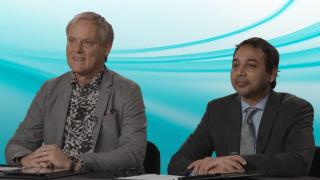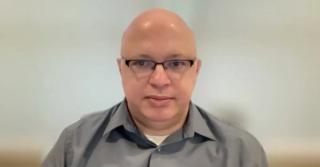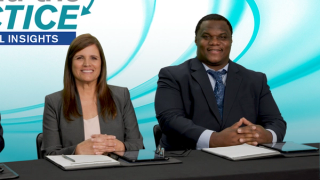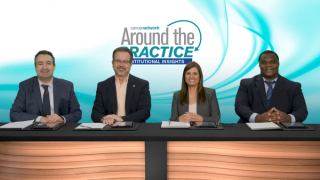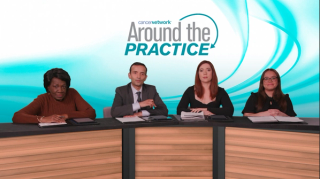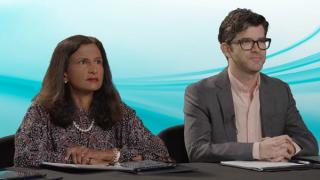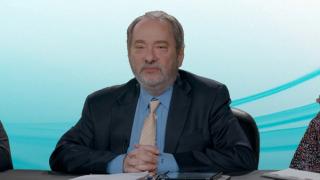
Multiple Myeloma
Latest News
Latest Videos

CME Content
More News

NEW ORLEANS-Bortezomib (Velcade), a first-in-class proteasome inhibitor, provides significant benefit when used as a single agent in the treatment of relapsed or refractory multiple myeloma. This was the principal finding of an interim analysis of

WASHINGTON-The FDA has approved Millennium Pharmaceuticals’ Velcade (bortezomib) injection for patients with multiple myeloma that has relapsed after two prior treatments and has shown resistance to the last treatment. Velcade was granted priority review by the FDA on March 10, 2003, and was approved approximately 2 months later. It has been just 4½ years from the first human dose to FDA approval.

PHILADELPHIA-Final data from a French prospective randomized trial show that high-dose therapy and double autologous transplantation improves survival of younger patients with multiple myeloma.

In the early 1980s, McElwain andcolleagues demonstrated thathigh-dose melphalan (Alkeran,100–400 mg/m2) was very effectivein patients with aggressive (plasmacell leukemia) or refractory myeloma.[1] Other researchers subsequentlyconfirmed these results.[2-4]Unfortunately, the duration of cytopeniaassociated with such treatmentwas excessive (3 to 4 weeks), leadingto a treatment-related mortalityrate of 10% to 20%.

Bolaños-Meade et al provide aconcise review of tandemtransplantation for patientswith multiple myeloma. High-dosechemotherapy with autologous stemcell support has been shown to improveresponse rates, event-free survival,and overall survival overconventional chemotherapy in a majorrandomized clinical trial-the IntergroupeFrançais du Myélome(IFM)-90 trial.[1] This procedure isnow accepted as the standard of carefor newly diagnosed myeloma patientsyounger than age 70 years. However,the same study demonstrated the needto improve upon single autografts, asthe overall survival rate at 7 years inthe transplant group was only 43%.Conceptual Basis ofTandem AutograftsUsing tandem transplants, investigatorshave aimed to improve outcomesby incrementally achievinghigher complete response rates withrepeated cycles of high-dose therapyrequiring stem cell support. With theirTotal Therapy protocol-a series ofnon–cross-resistant chemotherapyregimens culminating in tandemtransplantation-researchers from theArkansas Cancer Research Centershowed that the complete responserate increased from 26% to 41%following the first and second transplant,respectively.[2] On multivariateanalysis, complete response wasa significant prognostic factor forimproved outcome.

The use of high-dose chemotherapy and autologous stem cellsupport in the past decade has changed the outlook for patients withmultiple myeloma. In newly diagnosed patients, complete remissionrates of 25% to 50% can be achieved, with median disease-free andoverall survivals exceeding 3 and 5 years, respectively. Despite theseresults, autologous transplantation has not changed the ultimatelyfatal outcome of the disease, as there is no substantial evidence of“cure” in most published studies. An additional high-dose chemotherapycourse (with tandem transplants) appears to improve progressionfreesurvival, although the effect is not discernible until 3 to 5 yearsposttransplant. The recent reports of tandem autologous transplant formaximum cytoreduction followed by nonmyeloablative allogeneictransplant for eradication of minimal residual disease appears promisingand deserve further investigation. A central issue of tandemtransplants, whether they involve autologous or allogeneic transplants,revolves around defining the subsets of patients who will benefitfrom the procedure. Good-risk patients (defined by normal cytogeneticsand low beta-2–microglobulin levels), especially those who achievea complete or near-complete response after the first transplant, appearto benefit the most from a second cycle. High-risk patients (defined bychromosomal abnormalities usually involving chromosomes 11 and 13and high beta-2–microglobulin levels) whose median survival aftertandem transplant is less than 2 years should be offered novel therapeuticinterventions such as tandem “auto/allo” transplants. Until theefficacy and safety of this procedure is fully established, it should belimited to high-risk patients.

PHILADELPHIA-Two phase II clinical trials presented at the 44th Annual Meeting of the American Society of Hematology (ASH) have established the activity of the investigational proteasome inhibitor bortezomib (Velcade, also known as PS-341, Millennium Pharmaceuticals) in relapsed or refractory multiple myeloma.

PHILADELPHIA-Several novel biological agents active against multiple myeloma have recently moved from the laboratory to clinical trials. These agents work by targeting the interaction of the tumor cell and its bone marrow microenvironment, offering the potential for more specific, less toxic treatment, compared with conventional chemotherapy.

SEATTLE-A two-stage procedurethat combines high-dose chemotherapywith autologous stemcell transplantation (SCT) with animmunosuppressive (but notmyeloablative) allogeneic SCT inmultiple myeloma improves completeresponse rate and decreasestreatment-related mortality.

ROCKVILLE, Maryland-En-treMed, Inc. has begun a phase I study of its thalidomide derivative ENMD 0995 at the Mayo Clinic, Rochester, Minnesota, in patients with multiple myeloma. ENMD 0995 recently received orphan drug designation from the FDA for the disease.

ROCHESTER, Minnesota-Previous studies have shown the benefits of thalidomide (Thalomid) in patients with relapsed multiple myeloma. Now, researchers from the Mayo Clinic report that the oral combination of thalidomide and dexamethasone is feasible and active as initial therapy of the disease.

This special “Annual Highlights” supplement to Oncology NewsInternational is a compilation of the major advances in the managementof the lymphomas and leukemias during 2002, as reported in ONI.Commentaries by the editors, Drs. Gregory Bociek, James Armitage,and Michael Keating, provide perspective and prediction as to howthese developments may affect clinical practice.

PHILADELPHIA-Early reports of the efficacy of thalidomide (Thalomid) as initial therapy for multiple myeloma have been confirmed by researchers at The University of Texas M.D. Anderson Cancer Center, Donna Weber, MD, reported at a symposium sponsored by the University of Pennsylvania and the Multiple Myeloma Research Foundation.

CAMBRIDGE, Massachusetts-Millennium Pharmaceuticals, Inc. has begun a pivotal phase III clinical trial of Velcade (bortezomib) (formerly known as MLN341, LDP-341, and PS-341) in patients with multiple myeloma. Velcade is designed to block proteasomes, enzyme complexes in the cell responsible for breaking down a variety of proteins, including many that regulate cell division, the company said in a press release.

LITTLE ROCK-Deletion of chromosome 13 and hypodiploidy are major independent predictors of poor prognosis in multiple myeloma, according to a study involving close to 1,500 multiple myeloma patients (ASCO abstract 1054). "Chromosomal studies are the most important prognostic factor in the treatment of myeloma," said lead investigator Guido J. Tricot, MD, PhD, head of the Academic Division of Myeloma Transplant, Myeloma Institute for Research and Therapy, at the University of Arkansas for Medical Sciences in Little Rock. "Chromosome 13 deletion and hypodiploidy are associated with poor prognosis, but too many institutes are failing to do these studies which can predict outcome and help customize treatment."

CAMBRIDGE, Massachusetts-The proteasome inhibitor PS-341 produced objective durable responses in multiple myeloma patients with relapsed and refractory disease in a phase II multicenter trial (ASCO abstract 40). "The activity of the

CLEVELAND-Hospitalizations due to adverse events were less likely to occur among newly diagnosed multiple myeloma patients who received DVd (pegylated liposomal doxorubicin [Doxil]/vincristine/dexamethasone (than those who received VAd (vincristine/doxorubicin [Adriamycin]/reduced-dose dexamethasone). Early results from a randomized phase III trial were reported by Mohamad A. Hussein, MD, of the Cleveland Clinic. The data are very preliminary, as safety data could be collected on only 94 of 135 patients who are enrolled at 22 sites in the study (ASCO abstract 1107).

LITTLE ROCK-"For the first time, we have shown that with increasing age, the number of stem cells mobilized decreases," said Guido J. Tricot, MD, PhD, reporting the results of a multiple myeloma study (ASCO abstract 1055). Clinicians can

Bedford Laboratories announced that it has received approval from the Food and Drug Administration to market pamidronate disodium for injection. The product will be the only liquid version available on the market, and is equivalent to the Novartis pamidronate disodium product (Aredia), a bone resorption inhibitor indicated for the treatment of hypercalcemia associated with malignancy, for Paget’s disease, and for osteolytic bone metastases of breast cancer and osteolytic lesions of multiple myeloma.

EAST HANOVER, New Jersey-The US Food and Drug Administration has approved the Novartis drug Zometa (zoledronic acid for injection) for the treatment of patients with multiple myeloma and patients with documented bone metastases from solid tumors, in conjunction with standard antineoplastic therapy.

ORLANDO-The proteasome inhibitor MLN341 (formerly known as LDP-341 and PS-341) shows evidence of safety, biologic activity, and antitumor activity in the treatment of multiple myeloma, according to preliminary analysis of a phase II trial, Paul G. Richardson, MD, said at the 43rd Annual Meeting of the American Society of Hematology (abstract 3223). [The proteasome is an intracellular enzyme present in the cytoplasm and nucleus.]

The US Food and Drug Administration (FDA) has approved zoledronic acid (Zometa) for the treatment of bone complications in patients with multiple myeloma and patients with solid tumors, in conjunction with standard antineoplastic therapy.

ROCKVILLE, Maryland-Members of the Oncologic Drugs Advisory Committee (ODAC) have unanimously recommended that the Food and Drug Administration approve Zometa (zoledronic acid for injection, Novartis) for the treatment of bone metastases in patients with multiple myeloma and breast cancer, prostate cancer, lung cancer, and other solid tumors.

HOUSTON-The farnesyl transferase inhibitor R115777 (tipifarnib, also known as Zarnestra) produced an overall response rate of 33% in patients with chronic myelogenous leukemia (CML) and decreased splenomegaly in most patients with myelofibrosis, but was not effective in multiple myeloma, reported Deborah Thomas, MD, at the 43rd Annual Meeting of the American Society of Hematology. Dr. Thomas is assistant professor in the Department of Leukemia at The University of Texas M. D. Anderson Cancer Center in Houston.

SEATTLE-A two-stage procedure that combines high-dose chemotherapy with autologous stem cell transplantation (SCT) with an immunosuppressive (but not myeloablative) allogeneic SCT in multiple myeloma improves complete response rate and decreases treatment-related mortality.

